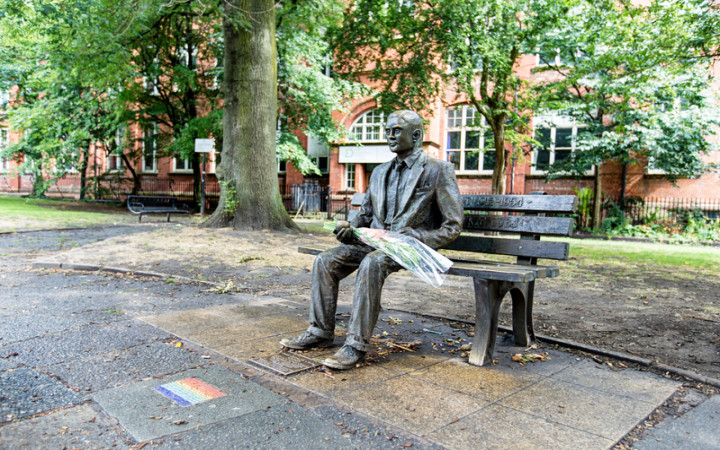Today’s Wonder of the Day was inspired by Sophie. Sophie Wonders, “Who was Alan Turing and why his accomplishment made him famous?” Thanks for WONDERing with us, Sophie!
Do you know anyone who has saved a life? What about millions of lives? Some believe that Alan Turing saved many millions of people during World War II. He wasn’t a great doctor or a famous general—he was a mathematician! So, how did he do it?
Alan Turing was a British mathematician and logician. He lived from 1912 to 1954. When he was young, he studied mathematics at the University of Cambridge in the United Kingdom and at Princeton University in the United States. When he finished his PhD at Princeton, Turing came back to the UK and joined the Government Code and Cypher School. Codes and ciphers are two ways of making secret messages.
Every country keeps some things secret, or private, from other countries. But they also want to find out the secrets that other countries may have. Turing began working for the British government to help them discover secrets from other countries. It was a very important time to do this work because World War II was just beginning. Countries like Britain and their allies wanted to know secrets from Germany. If they knew secrets—like when Germany would attack a place—they could send out a warning and keep more people safe. They could even help stop an attack.
The German government used a special machine called Enigma to make their coded messages. Britain knew that if they could use Enigma also, they could “break” the German code and find out their secrets. With help from Polish and other British mathematicians, Turing broke the Enigma code. Later, he broke a different Enigma code the German U-Boats used. Then he learned how to break another code the Germans used. By 1943, the British could decode about two messages every single minute! Knowing so much about where the German army would be helped save many lives. Breaking the German code helped the Allies win World War II much sooner—and that’s why some believe that Alan Turing may have helped save millions of lives!
After the war was over, Turing worked in a science laboratory. He was trying to make the first electronic computer. Another group of scientists beat him to it, so Turing joined them. He used another type of code to make the programming system. This software tells the computer what to do. He also wrote the first programming manual, which helped other scientists learn how to tell the computer what to do.
Turing helped make some of the very first computers. He was very interested in how computers work, and he wondered how “smart” computers could be. Could a computer really think the way people do? This is a question that scientists still wonder about today! Turing came up with a test to see if a computer can think the way a person does. This is called the “Turing test,” and we still use it. Here’s how the Turing test works: Let’s say that you’re chatting on a computer and someone answers you. Is that someone another person, or is it a computer? Most of the time we can easily tell if we’re talking to another person. Sometimes it can be hard to tell! If enough people think that the computer is a person, that computer would pass the test. Scientists use the Turing test now to see how “smart” a computer can be. Some say that a computer has already passed the Turing test; others say that nothing has passed the test, yet.
Alan Turing was gay, and that was against the law in Britain at the time. After his arrest in 1952,Turing could not work for the government anymore. He could not work on breaking codes anymore. But he kept working as a scientist until he died in 1954.
In Britain, they stopped arresting people for being gay in 1967. Then, in 2009, the leader of the UK’s government, Prime Minister Gordon Brown, apologized for how the government treated Alan Turing. He said, “We’re sorry, you deserved so much better.” In 2013, Britain’s queen, Queen Elizabeth II, pardoned Turing. And in 2016, the British government passed a law called “Turing’s Law.” The law says that other men arrested for being gay would receive pardons, too.
Alan Turing was not always respected or treated well while he was alive. Now we know how his work saved lives during World War II. Most experts see him as one of the first computer scientists. Any time you use a computer or talk to a “bot” online, you can thank Alan Turing! The UK has found ways to thank Turing in recent years. You can find statues of him, and his picture is even on a £50 note. How would you thank him?
Standards: CCRA.R.1, CCRA.R.2, CCRA.R.10, CCRA.L.4, CCRA.L.5, CCRA.SL.5, C3.D2.His.2.3-5, NGSS.4-PS4-3




